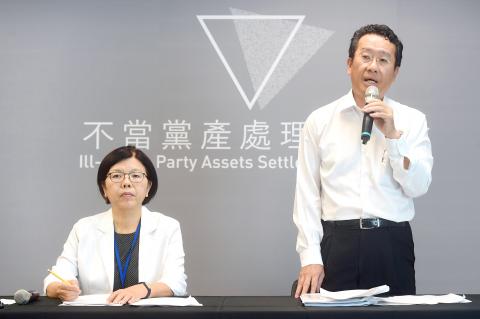The Ill-gotten Party Assets Settlement Committee yesterday said it froze a bank account of the Chinese Nationalist Party (KMT) over the issuance of 10 checks worth a collective NT$520 million (US$16.54 million) immediately after a law was promulgated prohibiting political parties from disposing of assets presumed to have been obtained illegally.
Following the implementation on Aug. 10 of the Act Governing the Handling of Ill-gotten Properties by Political Parties and Their Affiliate Organizations (政黨及其附隨組織不當取得財產處理條例), the KMT on Aug. 11 withdrew NT$520 million from Bank SinoPac (永豐銀行) and asked Bank of Taiwan (臺灣銀行) to issue 10 checks worth NT$52 million each, reportedly to pay for party expenses and employees’ salaries, committee spokeswoman Shih Chin-fang (施錦芳) said.
One check was cashed on Aug. 30, and funds were transferred to about 200 accounts, which might constitute a violation of the act, because the money is presumed to have been gained through illegal means and cannot be disposed of, Shih said.

Photo: Chien Jung-fong, Taipei Times
“The committee has asked SinoPac to freeze the KMT’s account, making it deposit-only,” committee Chairman Wellington Koo (顧立雄) said.
“Bank of Taiwan has been asked to place the nine uncashed checks on hold, in case anyone attempts to cash them,” Koo said.
If the cashed check was used to pay party employees’ salaries, the committee would ask the KMT, not the recipients, to return the money, Koo said.
Money in the SinoPac account is presumed to be ill-gotten, as the committee estimates that the KMT’s legitimate assets are worth about NT$630 million and its ill-gotten assets are worth NT$1.932 billion, while a total of NT$2.385 billion has been withdrawn from the account, Koo said.
Shih said the committee is to relaunch a Web site with the results of an investigation into ill-gotten party assets.
The Web site, launched in 2002 by the administration of former president Chen Shui-bian (陳水扁), was used to publish data gathered by an investigation between 2002 and 2007, but it was shut down in 2008 when former president Ma Ying-jeou (馬英九) took office.
“The committee decided to relaunch the Web site, because such data should be available to the public in a democratic nation such as Taiwan,” Shih said.
The committee is to hold a hearing to determine whether two holding companies — Central Investment Co (中央投資公司) and Hsinyutai Co (欣裕台股份有限公司) — are KMT affiliate organizations, if the two companies’ five shareholders are KMT trustees and whether their shares should be transferred to the state.
KMT Chairwoman Hung Hsiu-chu (洪秀柱) said the party is legally required to pay employees salaries and pensions, but the government is preventing it from meeting such a requirement.
“It is a shame that instead of doing what is necessary, the government has launched a political vendetta with no regard of the law,” Hung said, adding that all of the KMT’s assets are legitimate.
The KMT does not rule out the possibility of initiating protests, in addition to taking legal action, Hung said.

CHAOS: Iranians took to the streets playing celebratory music after reports of Khamenei’s death on Saturday, while mourners also gathered in Tehran yesterday Iranian Supreme Leader Ayatollah Ali Khamenei was killed in a major attack on Iran launched by Israel and the US, throwing the future of the Islamic republic into doubt and raising the risk of regional instability. Iranian state television and the state-run IRNA news agency announced the 86-year-old’s death early yesterday. US President Donald Trump said it gave Iranians their “greatest chance” to “take back” their country. The announcements came after a joint US and Israeli aerial bombardment that targeted Iranian military and governmental sites. Trump said the “heavy and pinpoint bombing” would continue through the week or as long

TRUST: The KMT said it respected the US’ timing and considerations, and hoped it would continue to honor its commitments to helping Taiwan bolster its defenses and deterrence US President Donald Trump is delaying a multibillion-dollar arms sale to Taiwan to ensure his visit to Beijing is successful, a New York Times report said. The weapons sales package has stalled in the US Department of State, the report said, citing US officials it did not identify. The White House has told agencies not to push forward ahead of Trump’s meeting with Chinese President Xi Jinping (習近平), it said. The two last month held a phone call to discuss trade and geopolitical flashpoints ahead of the summit. Xi raised the Taiwan issue and urged the US to handle arms sales to

State-run CPC Corp, Taiwan (CPC, 台灣中油) yesterday said that it had confirmed on Saturday night with its liquefied natural gas (LNG) and crude oil suppliers that shipments are proceeding as scheduled and that domestic supplies remain unaffected. The CPC yesterday announced the gasoline and diesel prices will rise by NT$0.2 and NT$0.4 per liter, respectively, starting Monday, citing Middle East tensions and blizzards in the eastern United States. CPC also iterated it has been reducing the proportion of crude oil imports from the Middle East and diversifying its supply sources in the past few years in response to geopolitical risks, expanding

Pro-democracy media tycoon Jimmy Lai’s (黎智英) fraud conviction and prison sentence were yesterday overturned by a Hong Kong court, in a surprise legal decision that comes soon after Lai was jailed for 20 years on a separate national security charge. Judges Jeremy Poon (潘兆初), Anthea Pang (彭寶琴) and Derek Pang (彭偉昌) said in the judgement that they allowed the appeal from Lai, and another defendant in the case, to proceed, as a lower court judge had “erred.” “The Court of Appeal gave them leave to appeal against their conviction, allowed their appeals, quashed the convictions and set aside the sentences,” the judges